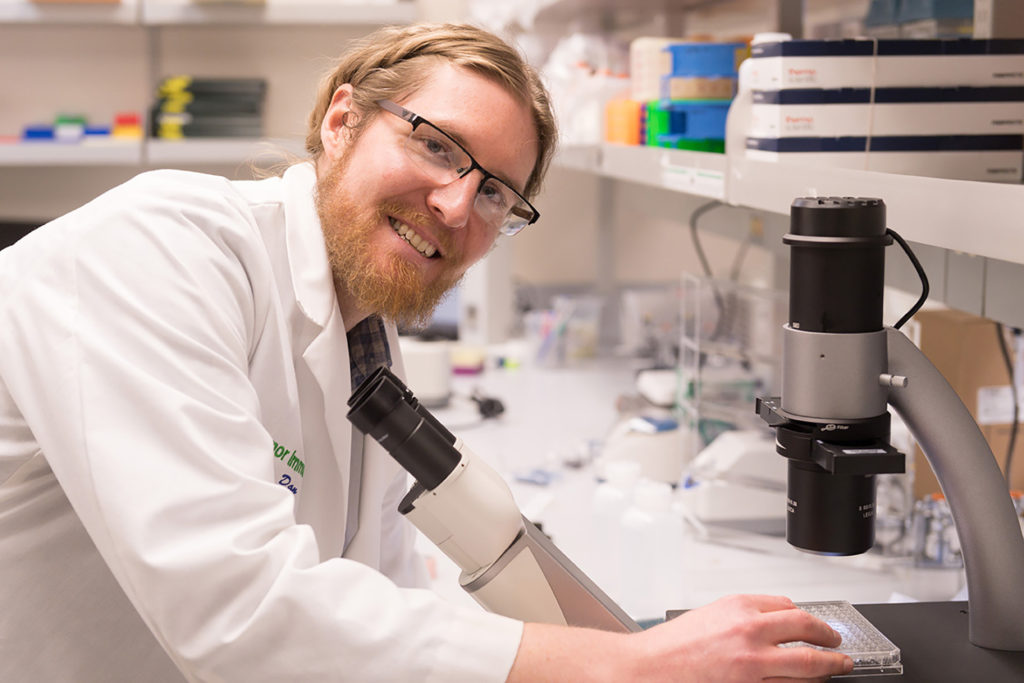
Dr. Dan Regan, DVM, PhD
Principal Investigator, Investigational Pathology Lab
As a child, I spent my days playing in the woods around my home in St. Simons Island, Georgia. My love of animals, biology, and science started with the freedom I had to explore the world around me.
When I was nine, we moved to Cleveland, Ohio. Living in two very different climate regions made me interested in the weather. When I went to college at the University of Georgia, I planned on becoming a weatherman. In fact, I loved skiing so much that I wanted to be a skiing weatherman.
A couple of classes later and a college dorm mate with a science major, I decided that I could follow my love of animals and science into veterinary medicine. I earned my DVM degree from UGA in 2011. I also completed my residency training in veterinary anatomic pathology in 2014 and a PhD in comparative pathology in 2017.
As a long-time lover of skiing, I was thrilled to accept my current faculty position at the Flint Animal Cancer Center and DMIP in the College of Veterinary Medicine and Biomedical Sciences at Colorado State University. I am not quite a skiing weatherman, but I am equally passionate about the work I’m doing in the field of comparative oncology.
I spend my team teaching a mixture of undergrad, graduate, and DVM courses in the Department of Microbiology, Immunology, & Pathology. I also direct a T32 DVM PhD combined degree training program and mentor PhD students on their research projects.
I am the principal investigator of the Investigational Pathology Laboratory at the FACC. Our focus is to increase our understanding of the interplay between the immune system and non-immune tumor stroma, and how these compartments of the tumor microenvironment (TME) promote metastasis as well as mediate extrinsic mechanisms of resistance to anti-cancer therapy, with a specific focus on lung metastasis. These investigations are focused on two primary diseases – breast cancer and osteosarcoma – due to the poor long-term outcomes for patients with metastatic forms of these cancers.
I am passionate about this work because the lack of improvement in outcomes for breast cancer and osteosarcoma patients is simply unacceptable.
The lab utilizes a combination of immunogenomic assays and pharmacologic approaches in 3D tumor-stroma co-culture models, human donor-derived primary cells, and mouse models. We are focused on elucidating the mechanisms by which tumor intrinsic molecular signaling as well as exosomes, macrophages, and lung fibroblasts interact to shape a pro-tumorigenic lung metastatic TME.
I also have a strong interest in comparative oncology and leveraging naturally occurring cancers in dogs as a high-value model for translating these preclinical investigations into novel therapies targeting the tumor microenvironment. In collaboration with the laboratory of Dr. Steve Dow, we discovered that the anti-hypertensive drug, losartan, can inhibit cancer migration and this drug has significant anti-metastatic effects.
The translational potential of these findings has been confirmed by utilizing this drug in clinical trials conducted in dogs with spontaneous osteosarcoma at the Flint Animal Cancer Center. Results from this canine trial have led to a phase I clinical trial in children with relapsed osteosarcoma being conducted in collaboration with Children’s Hospital Colorado and Children’s Healthcare of Atlanta.
Early findings of this study have been very promising. My team and I are very committed to continuing this work to improve outcomes for all species.
When I’m not working, I love to spend time with my wife and our three kids. We love to hike, camp, and of course, ski. We have five chickens, two snakes, one frog, a dog, and a cat.